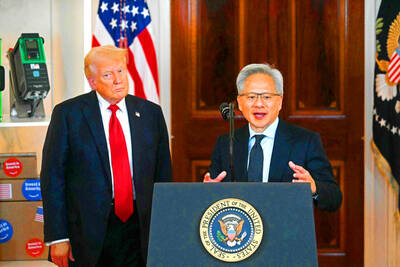Contract electronics maker Inventec Corp (英業達) yesterday said revenue would be flat this year, as unresolved US-China trade tensions and Intel Corp’s chip drought would exacerbate stagnation in PC and server demand.
The overall industry environment is very challenging, Inventec president Maurice Wu (巫永財) told investors in a teleconference yesterday.
In addition to fundamental weakness in PCs and servers, the US-China trade spat sabotages the world economy and electronics consumption, Wu said.
“There is almost zero growth for the two [PC and server] segments. This is a fundamental issue,” Wu said. “Intel’s CPU constraints is the second headache.”
It remains to be seen how fast Intel’s CPU supply would catch up with demand in the rest of this year, Wu said, echoing the CPU supply concern of bigger rival Compal Electronics Inc (仁寶) on Friday last week.
“We are conservative about this year’s revenue [outlook]. It should be flat,” Wu said.
Last year, Inventec posted revenue growth of 8 percent annually to NT$506.88 billion (US$16.44 billion), an all-time high.
PC and servers together accounted for 81 percent of Inventec’s total revenue last quarter, up from 77 percent a year earlier.
Smart devices made up 18 percent of revenue last quarter, down from 20 percent in the same period a year earlier.
Inventec suffered a dip in gross margin, which last quarter hit a six-year low at 4.1 percent, compared with 4.7 percent in the same period in 2017, attributable to better-than-expected PC demand, the company said.
THIN MARGIN
PCs have a thinner margin than the company’s two other major products, servers and smart devices, it said.
Another issue was a trough in terms of gross margin, the company said, adding that it expects a pickup this quarter, thanks to “decent” growth in revenue on an annual basis.
To improve gross margin, Inventec Appliance Corp (IAC, 英華達) plans to start operations at a new manufacturing site in Nanchang City, Jinangxi Province, to make new-generation products for a US client, given lower labor costs in China.
The company can save 70 percent on labor costs by allocating production to the Nanchang fab from its manufacturing base in Shanghai, the company said earlier this year.
IAC, a smart device manufacturing arm of Inventec, supplies AirPod earbuds for Apple Inc.
With new products from a client hitting the stores lately, Inventec expects a boost to its revenue, IAC chief executive officer David Ho (何代水) told investors.
Inventec yesterday said net profit fell 1.3 percent year-on-year to NT$5.6 billion last year, after reporting a 0.9 percent annual increase in net profit for the fourth quarter to NT$1.56 billion.
Inventec attributed last quarter’s growth to significant improvement in financial losses at its solar subsidiary.

Taiwan Semiconductor Manufacturing Co (TSMC, 台積電) last week recorded an increase in the number of shareholders to the highest in almost eight months, despite its share price falling 3.38 percent from the previous week, Taiwan Stock Exchange data released on Saturday showed. As of Friday, TSMC had 1.88 million shareholders, the most since the week of April 25 and an increase of 31,870 from the previous week, the data showed. The number of shareholders jumped despite a drop of NT$50 (US$1.59), or 3.38 percent, in TSMC’s share price from a week earlier to NT$1,430, as investors took profits from their earlier gains

AI TALENT: No financial details were released about the deal, in which top Groq executives, including its CEO, would join Nvidia to help advance the technology Nvidia Corp has agreed to a licensing deal with artificial intelligence (AI) start-up Groq, furthering its investments in companies connected to the AI boom and gaining the right to add a new type of technology to its products. The world’s largest publicly traded company has paid for the right to use Groq’s technology and is to integrate its chip design into future products. Some of the start-up’s executives are leaving to join Nvidia to help with that effort, the companies said. Groq would continue as an independent company with a new chief executive, it said on Wednesday in a post on its Web

CHINA RIVAL: The chips are positioned to compete with Nvidia’s Hopper and Blackwell products and would enable clusters connecting more than 100,000 chips Moore Threads Technology Co (摩爾線程) introduced a new generation of chips aimed at reducing artificial intelligence (AI) developers’ dependence on Nvidia Corp’s hardware, just weeks after pulling off one of the most successful Chinese initial public offerings (IPOs) in years. “These products will significantly enhance world-class computing speed and capabilities that all developers aspire to,” Moore Threads CEO Zhang Jianzhong (張建中), a former Nvidia executive, said on Saturday at a company event in Beijing. “We hope they can meet the needs of more developers in China so that you no longer need to wait for advanced foreign products.” Chinese chipmakers are in

POLICY REVERSAL: The decision to allow sales of Nvidia’s H200 chips to China came after years of tightening controls and has drawn objections among some Republicans US House Republicans are calling for arms-sale-style congressional oversight of artificial intelligence (AI) chip exports as US President Donald Trump’s administration moves to approve licenses for Nvidia Corp to ship its H200 processor to China. US Representative Brian Mast, the Republican chairman of the US House Committee on Foreign Affairs, which oversees export controls, on Friday introduced a bill dubbed the AI Overwatch Act that would require the US Congress to be notified of AI chips sales to adversaries. Any processors equal to or higher in capabilities than Nvidia’s H20 would be subject to oversight, the draft bill says. Lawmakers would have